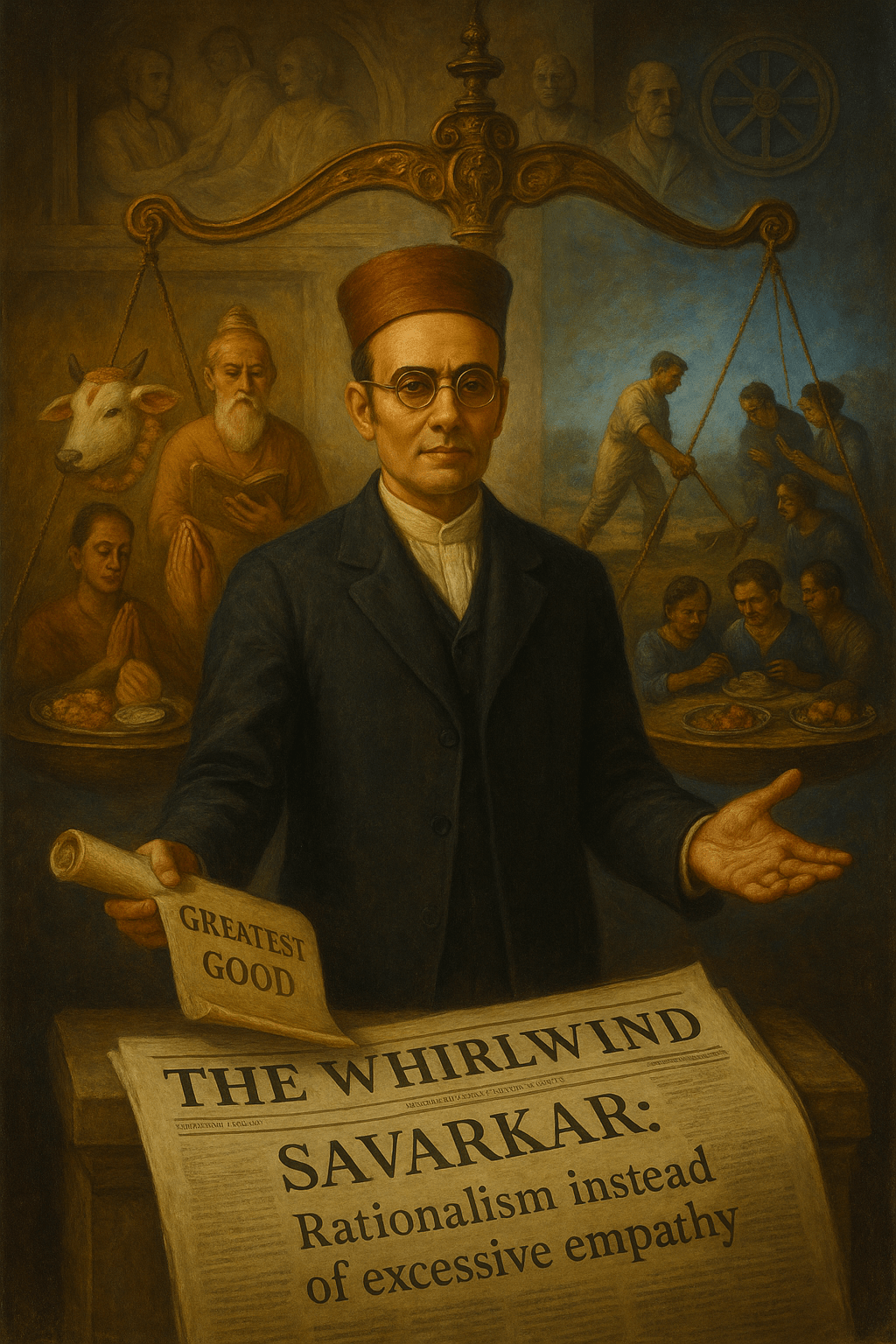Savarkar’s Philosophy & Worldview, Part 8, Savarkar’s Five Philosophical Dimensions (1/6)
Vinayak Damodar (Veer) Savarkar, a prominent Indian nationalist, philosopher, and social reformer, was known for his unique approach to philosophy, which blended Western ideas with the Indian context. Savarkar’s intellectual framework drew from various philosophical traditions, and one of the most prominent among them was utilitarianism. In this blog post, we’ll explore how utilitarianism shaped Savarkar’s thinking and influenced his social and political views.
Utilitarianism: The Ethical Foundation of Savarkar’s Thinking
Savarkar’s intellectual journey was deeply rooted in the teachings of utilitarianism, a school of thought championed by thinkers like Jeremy Bentham and John Stuart Mill. Utilitarianism holds that actions are right if they benefit the greatest number of people. Savarkar internalized this principle as his leading ethical guide, just as his mentor, Gopal Ganesh Agarkar, did in social reform. For Savarkar, the core of utilitarianism lay in promoting the greatest happiness for the greatest number, a belief he considered crucial to transforming Indian society.
Savarkar’s commitment to utilitarianism was not just theoretical; he saw it as a practical approach to solving societal issues. He argued that societal progress should be measured by the common good, not by adhering to outdated traditions or sacred texts. In his view, utilitarianism was not a mere abstract moral theory; it was a guiding principle for making political and social decisions. This approach was deeply pragmatic, and it reflected Savarkar’s belief in rational thought as a tool for societal advancement.
Savarkar’s Critique of Empathy and His Advocacy for Rationalism
In his philosophical approach, Savarkar criticized excessive empathy as the foundation of human value systems, which he saw as counterproductive. Instead, he emphasized that utilitarianism should focus on promoting the happiness and welfare of society as a whole, rather than on the selfish pursuit of individual pleasure. For Savarkar, the pursuit of happiness was not about selfish desires, but about working toward the greater good of the community.
Savarkar’s interpretation of utilitarianism was not without controversy, particularly in how he applied it to Hindu society. He argued that the teachings of Lord Krishna in the Bhagavad Gita were an early example of utilitarian thought. According to Savarkar, Lord Krishna’s teachings in the Gita emphasized the importance of duty and action for the benefit of society, even in the face of personal contradictions. For Savarkar, Krishna was the ideal utilitarian, balancing his actions for the greater good of the people.
Practical Applications of Utilitarianism
Savarkar’s utilitarian principles were not confined to theoretical discussions; they were applied to real-world issues facing Indian society. Two notable examples are his views on cow protection and non-vegetarianism.
a) The Utility of the Cow: A Pragmatic View
One of the most striking examples of Savarkar’s application of utilitarianism was his approach to the cow, a symbol of religious reverence in India. Savarkar was clear in his belief that the cow should be seen as a useful animal, rather than an object of worship. He argued that the cow’s economic value in agriculture and dairy production was far more important than the religious rituals surrounding its worship. For Savarkar, the utilitarian value of the cow lay in its contribution to agricultural productivity and economic development.
He proposed a rational, scientific approach to animal husbandry, emphasizing the need to breed and nurture cows for their utility in the economy. According to Savarkar, cow protection should be based on practicality and economic considerations, not religious superstition. He pointed out that India’s agricultural sector, crucial for the nation’s development, could be strengthened by adopting scientific methods of cattle rearing, which would lead to greater prosperity.
b) Non-Vegetarianism: A Radical Utilitarian Stance
Savarkar was also one of the earliest public figures to advocate for non-vegetarianism in Hindu society. In stark contrast to traditional religious views on the sanctity of cows, Savarkar argued that the consumption of beef could help alleviate food shortages and malnutrition in India. His stance was grounded in the belief that a utilitarian approach to food—choosing what was most beneficial for society—was more important than adhering to religious customs.
Savarkar’s defense of non-vegetarianism was part of his broader philosophy of rejecting absolute moral codes, such as the doctrine of non-violence (Ahimsa) when applied to situations of self-defense or national security. For him, morality was not about following rigid principles but about what contributed to the well-being of society in practical terms. Actions that promoted the welfare of the people, even if they involved difficult choices, were morally justified in Savarkar’s view.
Final Thoughts: Savarkar’s Unique Contribution to Indian Philosophy
Savarkar’s utilitarianism was not a simple adoption of Western ideals. He adapted these concepts to the Indian context, using them to challenge traditional practices and call for a rational, pragmatic approach to societal issues. His views on the cow, non-vegetarianism, and the role of religion in public life all reflect his commitment to the greater good of society, emphasizing practical solutions over dogma. Through this lens, Savarkar contributed significantly to the intellectual discourse of his time, offering a vision of a modern, rational, and utilitarian India.
In the next part of this series, we will explore Savarkar’s Rationalism & Positivism and how it influenced his ideas on education, science, and social reform. Stay tuned for a deeper dive into the intellectual legacy of one of India’s most influential thinkers.
What are your thoughts on Savarkar’s utilitarian approach? How do you think his ideas might still resonate in today’s societal context? Share your views in the comments below!
Sources:
LEDERLE, Matthew. 1976. Philosophical Trends in Modern Maharashtra. Popular Prakashan: Bombay (Mumbai).
PHADTARE, T. C. 1975. Social and Political Thought of Shri V.D. Savarkar. A Thesis submitted to the Marathwada University for the Degree of Doctor of Philosophy. Unpublished: Aurangabad.
SAVARKAR, Vinayak Damodar .2007. Hindu Rashtra Darshan. Bharat Bhushan. Abhishek Publications: New Delhi.


Leave a Reply